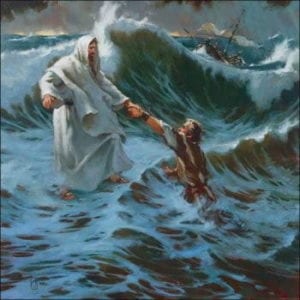
One of my favorite stories from the Old Testament is the story of the prophet Elijah. After Elijah had slit the throats of four hundred and fifty prophets of Baal at the brook of Kishon, Jezebel the queen was enraged and she sought to have Elijah killed. Elijah fled for his life and ended up in a cave on Mount Horeb. Elijah was distraught and called out to God for help. God told Elijah to stand before Him, for He will be passing by. There was a heavy wind, but the Lord was not in the heavy wind. There was an earthquake, but the Lord was not in the earthquake. There was a fire, but the Lord was not in the fire. Then there was a tiny, whispering sound… the Lord was in the whispering sound!
It is not unusual for various phenomena, such as wind, earthquakes and fire to accompany theophanies. In the Old Testament, God appeared to Moses and the Israelites with peals of thunder and lightning, a heavy cloud (Exodus 19:16), and fire which blazed the whole mountain (Deuteronomy 4:11). However, God chose to reveal Himself in a light, almost inaudible sound to Elijah. That is the part of Elijah’s story that I really liked, because many times, we look for God in the wrong places. We imagine that we can find God in some spectacular display or in a supernatural way. We seldom try to find God in the silence of our hearts, and yet most of the time, that is where we can find God speaking to us. In Psalm 46:11, the Lord tells us: “Be still and know that I am God!”
In the Gospel of Matthew, the disciples were in a boat being tossed about by the waves, for there was a strong wind blowing against it. Then Jesus came towards them, walking on the sea. That scene is a theophany. Jesus is the Son of God, and He appeared to His disciples accompanied by the strong wind and big waves. But the disciples on the boat did not recognize Him, for they thought it was a ghost. The disciples did not expect Jesus to be walking on the water. But they recognized Him after He spoke; He said, “Take courage, it is I, do not be afraid!” Peter took Jesus’ words to heart and said, “Lord, if it is you, command me to come to you on the water.” And Jesus said, “Come!”
To “walk on water” means to step out in faith. Peter stepped out of the boat and began to walk on water, but when he saw how strong the wind was, he became afraid and began to sink. Jesus stretched out His hand and caught Peter, and they both got into the boat. Jesus asked Peter, “O you of little faith, why did you doubt?” Going back to the story of Elijah, when God approached him in the small, still voice, He said, “Why are you here, Elijah?” God was telling Elijah: Why did you doubt me and run away to this place? Elijah replied, ““I have been most zealous for the LORD, the God of hosts, but the Israelites have forsaken your covenant. They have destroyed your altars and murdered your prophets by the sword. I alone remain, and they seek to take my life.” (1Kings 19:14) But God commanded Elijah to go back. After Elijah went back and did the things God commanded him, he was taken up to heaven in a flaming chariot.
The message here is clear. We do “walk on water” when we set out to do something in faith. But when the going gets rough, we doubt and we falter. Like Peter, we sometimes cry out to God to save us, or like Elijah, we sometimes just run away from our troubles. But in either case, we can be sure that God is always with us. Time and again, that had been proven by the scriptures, the lives of the saints and even in our own lives. God is always with us: whether speaking to us in a small, still voice in our hearts, or stretching out His hand to catch us. God is telling us: do not be afraid, do not doubt, but have faith!